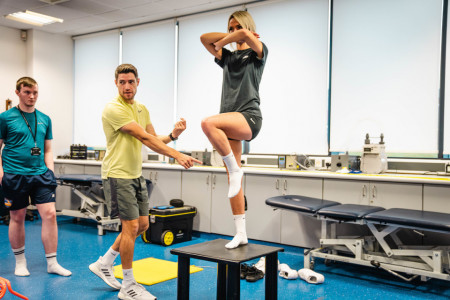
University of Bolton, Deane Road, Bolton. BL3 5AB
Tel:
Email:


“At the University of Bolton, we take great pride in providing a quality, supportive learning environment for our students.”
Professor George E Holmes DL | President & Vice Chancellor
“...tutors are very supportive and you’re not just a student ID number, at this university you are an individual with a name.”
Ellisse Vernon | BSc (Hons) Adult Nursing
Back to menu
Back to menu
Study with an Off-Campus Partner
Back to menu
Back to menu
University of Bolton, why we are the right choice
Location - Bolton, Greater Manchester

01/02/2022
Is the MSc Physiotherapy (Pre-registration) course difficult? We help you navigate this highly rewarding master’s.
Essentially, there are two types of postgraduate degrees for those looking to work in physiotherapy. There’s the master’s in physiotherapy for physiotherapy graduates, and there’s the pre-registration course designed for those who don’t have a background in this subject.

If you’re looking to study the MSc Physiotherapy (Pre-registration) course at the University of Bolton, here’s everything you need to know…
There’s a lot of anatomy
When studying for a master’s in physiotherapy, you’ll have to spend a lot of time getting to understand human anatomy. This is often why you may hear other master’s students talk about the challenges of the course. But remember that the difficulty of studying physiotherapy is relative to the individual. For those who are strong in biological sciences, anatomy may not be as tricky.
If you are applying for a pre-registration course, there’s a chance you haven’t done much on anatomy in previous training. But some of our top tips for navigating these modules are:
1) Slow down to go faster – get to grips with the basics first and everything else will follow
2) Study anatomy section by section – don’t try to learn everything in one go
3) Concentrate during anatomy tutorials – these will help you learn at a more advanced level
4) Learn to speak to the lingo – use ‘anatomy language’ and train yourself to get used to it
5) Create a study group so you can share notes and help each other fill in knowledge gaps
It’s also hugely beneficial for students to start making links with structure and function within the anatomy. By understanding these links quickly, you’ll be able to support learning and improve memory. For instance, by forming a connection between the structure of a specific muscle to its primary function in the body, you’ll be able to grasp the ‘how’ and ‘why’ of anatomy.
You have to be dedicated
Compared to undergraduate training, the workload may feel a lot more intense. With the complex study of anatomy, it’s worthwhile spending a bit of extra time revising. This does mean that you won’t be as carefree as you were in your undergraduate degree. But this is pretty much the case with all postgraduate courses, and independent study will be a major aspect of your success.
By improving your study techniques, you can manage your workload much more effectively. One thing that some students do to accelerate their learning is to make their study time as visual as possible. Instead of just relying on pictures in textbooks, draw your own pictures. This can help to improve memory and understanding.
The most important thing though is to be prepared for the work ahead. Your organisation skills will have to be second-to-none, as effective planning is going to be the key to making your life easier during your master’s.
A good way to get the most out of your course is to combine self-study techniques with group study. Both can be beneficial, so you should spend time doing both. However, everyone is different when it comes to studying. So if you are finding group study to be disruptive, switch to doing it on your own instead.
Lastly, don’t forget to have regular breaks. Yes, the workload will be more intense than your first degree and you won’t spend as much time socialising. But breaking away from your work will help you rejuvenate, boosting your productivity. So don’t turn down every single invite, and be sure to focus on self-care activities too.
Soft skills aren’t just a ‘nice-to-have’
In addition to the intensive study of anatomy, you also have to work on being a better person! According to the NHS, those looking to physiotherapy should have the following traits:
Sensitivity for other people’s feelings
Tolerance for different types of people
Excellent communication skills
The ability to work as part of a team
Reliability and trustworthiness
If you’re already a great ‘people’ person, you’ve got a natural advantage. But don’t worry if you’re a bit shy or introverted. The most important thing is that you care and have a passion for your job and for helping others improve their quality of life.
As long as you remember to work on your soft skills (and work on any areas where you need improvement), there’s no reason why you can’t be hugely successful in this career.
Are you interested in doing a master’s in physiotherapy? As a leading Greater Manchester university that puts students, and their needs first, there’s nowhere better to begin your journey than the University of Bolton.
Our dedicated and passionate faculty will provide a friendly and supportive learning environment, making it easy for students doing their pre-registration master’s in physiotherapy to catch up on anatomy and other challenging aspects of the course.
To find out more about applying in 2022/23, see our available courses.